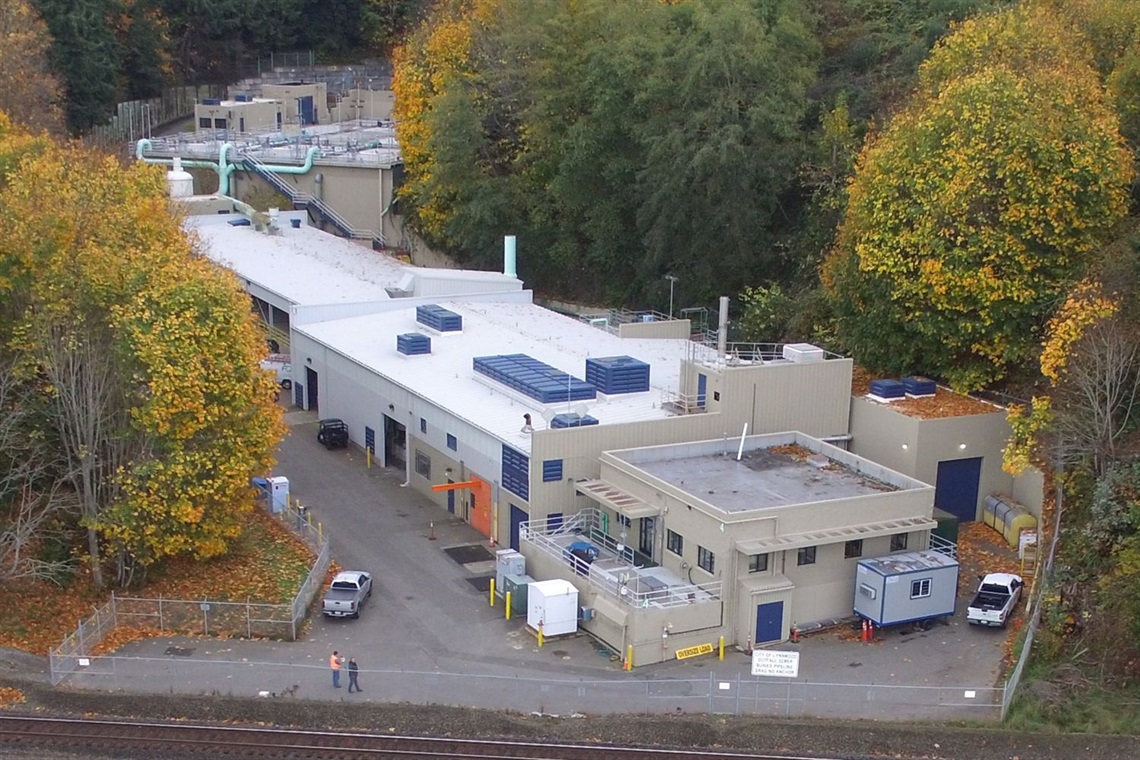Lynnwood Receives EPA Penalty for Wastewater Treatment Plant Violation
Published on November 14, 2023

On Monday November 13th, the Lynnwood City Council took action authorizing Mayor Christine Frizzell to enter into an agreement with the U.S. Environmental Protection Agency that requires the shutdown of the City's sewage sludge incinerator (SSI) at its wastewater treatment plant no later than May 31st, 2024, and imposes a penalty of $550,259 per EPA's policy for settlements.
The EPA issued a Notice of Violation alleging multiple instances of noncompliance with emissions limits, operating limits, and stack testing requirements. Lynnwood and EPA have engaged in a cooperative process to address the alleged noncompliance that is on course to result in the settlement agreement.
The City will decommission the sludge incinerator by the end of May 2024, and begin a multi-year process of replacing it with a system that does not incinerate sludge, eliminating any future potential of exceeding air quality standards. The EPA acknowledged the sludge handling improvements as demonstration of Lynnwood's continued commitment to meeting emissions standards. The incinerator has complied with all air quality standards that were applicable when the incinerator was installed in 1993. The problems with compliance began after new, more stringent, air quality standards were adopted by the EPA in 2016.
“The City of Lynnwood takes its environmental compliance responsibilities very seriously and has a longstanding commitment to the health and safety of our community. Our employees have fully cooperated with the EPA throughout this process and have exhibited their commitment to meeting these responsibilities time and time again,” Lynnwood Mayor Christine Frizzell said. “Wastewater treatment plants are complex and expensive facilities, and we rely on our customers' funding to support these vital systems. While we respect the EPA’s obligations to enforce the standards, we are disappointed that the law requires such a substantial penalty with ratepayer funds going to the US Treasury instead of being invested back into our community. I fully support our dedicated wastewater treatment employees who work tirelessly to protect our community’s public health and environment.”
This is happening at the start of a decade-long series of capital projects to rebuild the Lynnwood Wastewater Treatment Plant to meet new Puget Sound wastewater discharge standards, to prepare for anticipated growth, and to replace worn-out equipment.
None of these exceedances were due to operator error but were rather due to the failure of the SSI and scrubber equipment to perform as expected.
“Lynnwood's Wastewater Treatment Plant has a long history of complying with environmental regulations the vast majority of the time and has even been given excellence awards for years when there were no noncompliance issues,” Lynnwood Public Works Director Bill Franz said. “This has been a frustrating experience for our dedicated staff, who pride themselves on assuring compliance with the many standards that apply to the Treatment Plant and that we know our community expects.”
History of the SSI and its Testing
Lynnwood installed an upgraded sewage sludge incinerator at its wastewater treatment plant in 1993. The City obtained an air quality permit while authorizing us to operate this incinerator. The federal Clean Air Act authorizes the EPA to impose and enforce emissions limits on sewage sludge incinerators.
In 2016, the EPA issued new SSI regulations with stricter emissions limits and that require routine source testing of stack emissions, as well as monitoring of operating conditions, to assure compliance with the emissions limits. In response, in 2015 Lynnwood Public Works commenced installation of a new scrubber to control emissions from the SSI and comply with the EPA regulations. Installation and start-up of the new scrubber occurred in October 2016, with initial stack emissions compliance testing in January 2017. Despite best efforts to comply, numerous stack tests have not shown that Lynnwood was in compliance.
The City retained an SSI engineering and operations firm, an environmental consultant and coordinated with the scrubber manufacturer in repeated efforts to achieve compliance. After several recommended modifications and numerous emissions tests to evaluate their effectiveness, the City has still not been able to demonstrate compliance fully.
A significant issue has been that Lynnwood was unable to operate the incinerator at 85% of maximum capacity, or at minimum combustion temperature, and the stack testing revealed emissions levels above some of the standards from time to time.
Lynnwood did meet the standards for many of the regulated emissions, including the pollutants that were of most significant concern for health impacts. During some tests, Lynnwood was not able to demonstrate compliance with the emissions limits for particulate matter (PM), hydrogen chloride (HCl), and carbon monoxide (CO). The age and overall condition of the SSI made it challenging to achieve the operating conditions necessary to perform a fully compliant stack test.
Lynnwood's initial modifications resulted in achieving compliance with standards for PM and CO, but the test results for HCl were mysteriously variable until the latest test in 2023. The most recent tests indicate we are operating within all emissions limits, but still cannot achieve operation at 85% of the maximum capacity necessary to perform a compliant stack test.
The City of Lynnwood will provide more information as it is available. To learn more about the Wastewater Treatment Plant and to sign up for updates, visit lynnwoodwa.gov/WWTP.